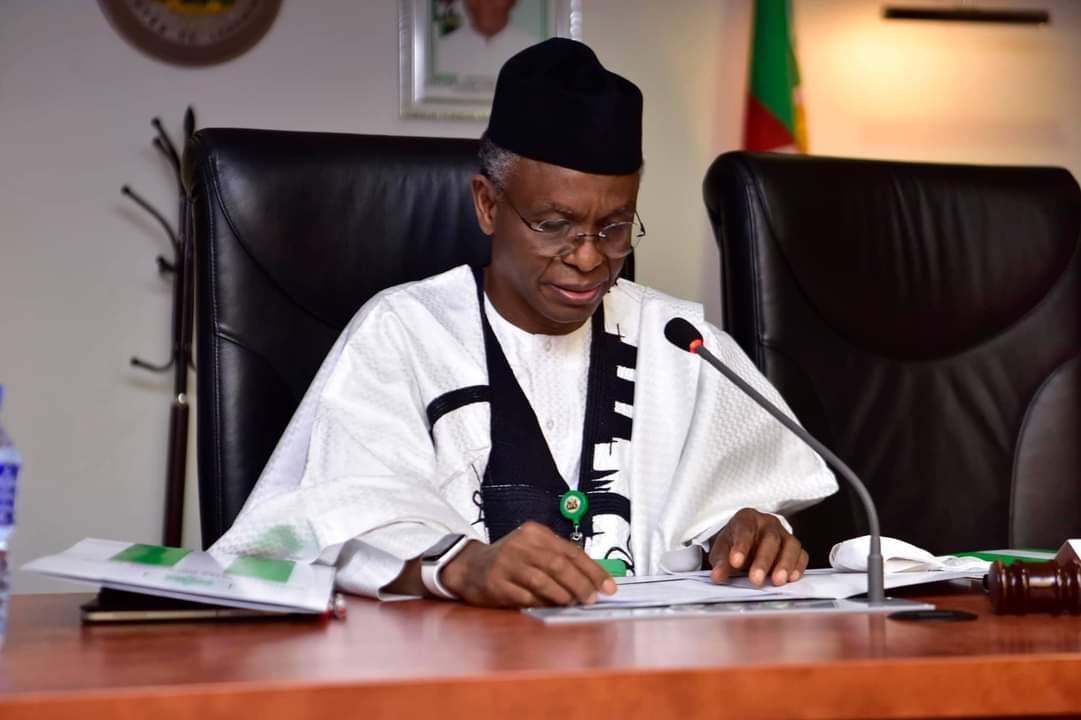El-Rufa’i, Zazzau emirate and injustice – A rejoinder
Since the death of the 18th Emir of Zazzau, Alhaji (Dr) Shehu Idris, the struggle for the 19th emirship generated a lot of commentaries. In all the comments, I decided to remain aloof until recently, when I came across an article published by one Dr. Nasiru Aminu, a senior lecturer in the Department of Economics, […]

Governor Nasir El-Rufai of Kaduna State
Since the death of the 18th Emir of Zazzau, Alhaji (Dr) Shehu Idris, the struggle for the 19th emirship generated a lot of commentaries. In all the comments, I decided to remain aloof until recently, when I came across an article published by one Dr. Nasiru Aminu, a senior lecturer in the Department of Economics, Cardiff Metropolitan University; to which I want to present a rejoinder. Two things triggered my response: Firstly, the writer is a son to one of the throne’s contenders. Secondly, he is a professional colleague from one of the leading universities globally. Nonetheless, it is assumed that anybody who teaches in this kind of university should have mastered the art and science of academic writing that is driven by factual and objective analysis of issues.
It seems Dr Aminu allowed emotion to have overshadowed his faculty of reasoning in writing the article. That is why he ended up making some claims that were not based on historical facts.
- Abuja-Kaduna rail: Amaechi orders Chinese to fix trains
- Emir of Zazzau: Kaduna govt queries 4 kingmakers for absence at meeting
One of these claims is the wrong dating of the colonial government’s involvement in the affairs of Zazzau Emirate’s succession. The colonial government was formally established in Northern Nigeria in 1900, when the Northern Protectorate was recognised upon the cancellation of the Royal Niger Company’s Charter. And by this time, Kwasau was already three years on the throne, because he became the Emir of Zazzau in 1897 in an unusual manner after the death of his father, Sarki Yero. Therefore, Kwasau’s removal was in 1902 after he invited Lugard to establish a military garrison at Zaria due to the security challenges that characterised his administration. However, the throne remained without a substantive emir for six months but it was temporarily held by a Habe Prince, Galadima Suleimanu.
Another claim was on the circumstance that led to the dethronement of Emir Aliyu Dan-Sidi in 1920, which he said was because of ‘slavery and corruption’. He cited the book of Smith, but he could not read the same book to understand the period of colonial establishment of formal administration.
Whatever it is, believing in this claim from the colonial literature is nothing but Eurocentric mentality; it was refuted by some critics. Though nobody can deny the inhumanity embedded in slavery engaged by many African traditional rulers, but colonialists regarded slave trade as a lucrative business. It became illegal only after it turned out to be an economic liability for the British arising from the advances brought about by industrial revolution. Moreover, Emir Aliyu Dan-Sidi, like many other emirs then, had suffered the wrath of colonial invaders because of the difficulties in adjusting to the new order imposed by colonialism. The gradual imposition of the new order led to continuous reduction of trust to the colonial government and consequently, he started resisting some of the colonial draconian policies. This was central to his removal; just as it happened to the emirs of Gwandu and Sokoto (see Tibenderana, 1987).
More so, the writer’s claim for the stoppage of rotating succession among various dynasties in some emirates was an exposition of the hidden agenda to actualise same in the Zazzau Emirate. No wonder the contest to the throne of the 19th Emir of Zazzau was like a war without carnage! For me, thinking along this line is the highest injustice that the writer was referring to. What appeared in this hidden agenda, however, is to eliminate the Mallawa dynasty because according to him, the first emir of the Fulani Zazzau and founder of the Mallawa dynasty, Mallam Musa Bamalli, remained only a scholar not an emir. He claimed that even Sheikh Danfodio did not lead. I suggest that Dr Aminu may like to read Bunza’s book (2016) on Gwandu Emirate to know whether Shehu once led the emirate or not.
Regarding the issue of right to the throne, His Highness, the 19th Emir is a descendant of Mallam Musa Bamalli. Genealogically, he is the son of late Magajin Gari Alhaji Nuhu Bamalli, the son of Yero Auta, and the son of Abubakar Dadda’u (Autan Musa), the 12th child of Mallam Musa Bamalli. In recognition of his direct lineage with the original flag-bearer of the Zazzau Emirate, he was the only prince from the emirate to have been given the flag by the Sultanate during the 200-year anniversary in 2004.
Finally, as the writer describes the 100 years of Mallawa dynasty’s interregnum as a will of God, he should also regard their return to the throne as such.
Aminu Musa teaches political science at Federal University Birnin Kebbi.
